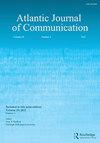The development of online participatory cultures: from baseball analytics to covid conspiracy
IF 1
Q3 COMMUNICATION
引用次数: 0
Abstract
ABSTRACTThis paper explores online participatory culture from the early 1990s to the present, highlighting three trends that exemplify its development and eventual co-option by corporate and political movements. In the 1990s, a participatory culture around baseball analytics emerged online, characterized by a challenge to traditional notions of knowledge in the sport. By the 2000s, online participatory cultures began populating social media platforms that were searching for new ways to increase user engagement. One such culture, the self-tracking fitness movement, focused on individual self-improvement via quantifying the body’s activity, while promoting a relocation of expert knowledge to the online technology and fitness platforms that housed the movement. During the COVID-19 pandemic, notions of expert knowledge and individualized approaches to the body, aspects of the first two trends, were manipulated by far-right rhetoric and transformed by mis- and disinformation disseminated on the now-ubiquitous social media platforms. The study concludes by analyzing philosopher Giorgio Agamben’s condemnation of COVID-19 public health mandates, exploring how the theories underlying both baseball analytics and self-tracking were used to valorize individualistic health freedom over collective well-being. Disclosure statementNo potential conflict of interest was reported by the author(s).在线参与式文化的发展:从棒球分析到covid阴谋
摘要本文探讨了从20世纪90年代初至今的在线参与式文化,强调了其发展和最终被企业和政治运动所选择的三个趋势。在20世纪90年代,围绕棒球分析的参与性文化在网上出现,其特征是对传统的体育知识观念的挑战。到21世纪初,在线参与式文化开始充斥社交媒体平台,这些平台正在寻找增加用户参与度的新方法。自我追踪健身运动就是这样一种文化,它通过量化身体的活动来关注个人的自我提升,同时推动将专业知识转移到在线技术和健身平台上。在2019冠状病毒病大流行期间,专业知识和个性化身体方法的概念(前两种趋势的各个方面)受到极右翼言论的操纵,并被如今无处不在的社交媒体平台上传播的错误和虚假信息所改变。该研究最后分析了哲学家乔治·阿甘本(Giorgio Agamben)对COVID-19公共卫生任务的谴责,探索了棒球分析和自我跟踪背后的理论如何被用来评价个人主义的健康自由,而不是集体福祉。披露声明作者未报告潜在的利益冲突。
本文章由计算机程序翻译,如有差异,请以英文原文为准。
求助全文
约1分钟内获得全文
求助全文

 求助内容:
求助内容: 应助结果提醒方式:
应助结果提醒方式:


